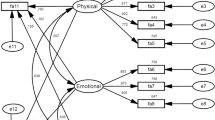Abstract
Goals of work
The purpose of this research is to study the validation of the Chinese version of Multidimensional Fatigue Inventory-20 in measuring fatigue status of the patients with cancer in China.
Materials and methods
The original English version of the Multidimensional Fatigue Inventory-20 was translated into a Chinese version, which was applied to measure the fatigue status of cancer patients prior to commencing chemotherapy and during the last week of chemotherapy, respectively. The reliability and criterion-related validity of the Chinese version of the Multidimensional Fatigue Inventory-20 were assessed by calculating Cronbach's α and Pearson correlation coefficients. The construct validity was analyzed by employing factor analysis.
Main results
There were three dimensions in the Chinese version of the MFI-20, which measures the physical, mental, and spiritual fatigue of patients with cancer. All of the correlation coefficients between EORTC QLQ-C30V3.0 and MFI-20 were statistically significant (P < 0.0001). The Cronbach's α coefficient was more than 0.8 and 0.7 for total MFI-20 and for the three dimensions of the Chinese version of the MFI-20, respectively.
Conclusions
The Chinese version of the MFI-20 is a reliable and valid instrument to assess fatigue in Chinese patients with cancer.
Similar content being viewed by others
References
Winningham ML, Nail LM, Burke MB et al (1994) Fatigue and the cancer experience: the state of the knowledge. Oncol Nurs Forum 21(1):23–36
Giacalone A, Polesel J, Paoli AD et al (2010) Assessing cancer-related fatigue: the psychometric properties of the Revised Piper Fatigue Scale in Italian cancer inpatients. Support Care Cancer 18:1191–1197
Haghighat S, Akbari ME, Holakouei K et al (2003) Factors predicting fatigue in breast cancer patients. Support Care Cancer 11(8):533–538
Romito F, Montanaro R, Corvasce C et al (2008) Is cancer-related fatigue more strongly correlated to haematological or to psychological factors in cancer patients? Support Care Cancer 16(8):943–946
Curt GA, Breitbart W et al (2000) Impact of cancerrelated fatigue on the lives of patients: new findings from the Fatigue Coalition. Oncologist 5:353–360
Chang YJ, Lee JS, Lee CG et al (2007) Assessment of clinical relevant fatigue level in cancer. Support Care Cancer 15(7):891–896
Piper BF, Lindsey AM, Dodd MJ (1987) Fatigue mechanism in cancer patients: developing nursing theory. Oncol Nurs Forum 14:17–23
Smets EM, Garssen B, Bonke B, De Haes JC (1995) The Multidimensional Fatigue Inventory (MFI) psychometric qualities of an instrument to assess fatigue. J Psychosom Res 39:315–325
Hagelin CL, Wengström Y, Runesdotter S, Fürst CJ (2007) The psychometric properties of the Swedish Multidimensional Fatigue Inventory MFI-20 in four different population. Acta Oncol 46:97–104
Smets EM, Garssen B, Cull A, De Haes JC (1996) Application of the multidimensional fatigue inventory (MFI-20) in cancer patients receiving radiotherapy. Br J Cancer 73:241–245
Aronson NK, Cull A, Keasa S et al (1994) The European Organization for Research and Treatment of Cancer (EORTC) modular approach to quality of life assessment in oncology. Int J Ment Health 23(2):75–96
Zhen LC, Tian HR, Xie PZ (2000) Medical quality of survival evaluation. Junshi Yixue Kexue Press, Beijing
Nunnally JM, Bernstein IH (1994) Psychometric theory, 3rd edn. McGraw-Hill, New York
Schneider RA (1998) Reliability and validity of the Multidimensional Fatigue Inventory (MFI-20) and the Rhoten Fatigue Scale among rural cancer outpatients. Cancer Nurs 21(5):370–373
Gentile S, Delarozière JC, Favre F, Sambuc R, San Marco JL (2003) Validation of the French ‘multidimensional fatigue inventory’ (MFI 20). Eur J Cancer Care 12:58–64
Hagelin CL, Wengström Y, Fürst CJ (2009) Patterns of fatigue related to advanced disease and radiotherapy in patients with cancer—a comparative cross-sectional study of fatigue intensity and characteristics. Support Care Cancer 17:519–526
Kuhnt S, Ernst J, Singer S, Rüffer JU, Kortmann R-D, Stolzenburg J, Schwarz R (2009) Fatigue in cancer survivors—prevalence and correlates. Onkologie 32:312–317
Munch TN, Strömgren AS, Pedersen L, Petersen MA, Hoermann L, Groenvold M (2006) Multidimensional measurement of fatigue in advanced cancer patients in palliative care: an application of the Multidimensional Fatigue Inventory. J Pain Symptom Manage 31(6):533–541
Lundh HC, Wengström Y, Runesdotter S, Fűrst CJ (2007) The psychometric properties of the Swedish Multidimensional Fatigue Inventory MFI-20 in four different populations. Acta Oncol 46:97–104
Acknowledgments
Supported by the Natural Science Foundation of China, no. 81041066
Conflict of interest
No conflicts of interest to declare.
Author information
Authors and Affiliations
Corresponding author
Rights and permissions
About this article
Cite this article
Tian, J., Hong, JS. Validation of the Chinese version of Multidimensional Fatigue Inventory-20 in Chinese patients with cancer. Support Care Cancer 20, 2379–2383 (2012). https://doi.org/10.1007/s00520-011-1357-8
Received:
Accepted:
Published:
Issue Date:
DOI: https://doi.org/10.1007/s00520-011-1357-8




